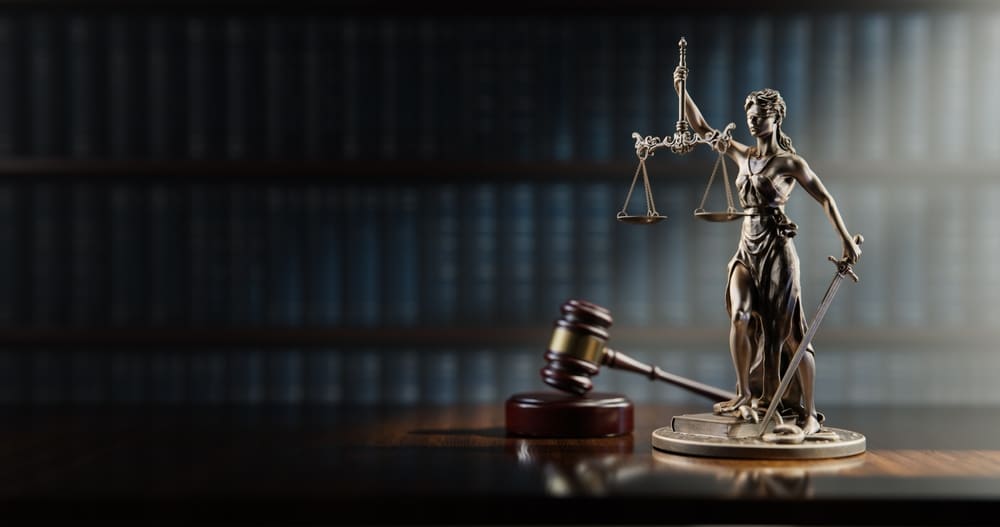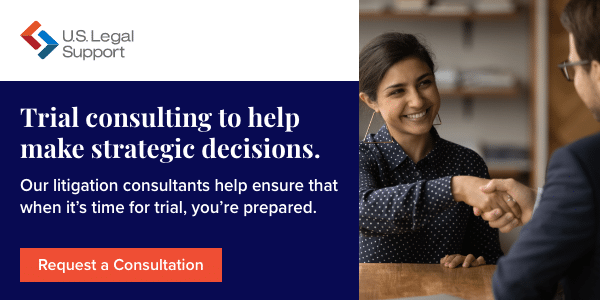Building a Strong Trial Narrative to Improve Outcomes

Trial strategy isn’t solely a matter of collecting and presenting the right set of evidence and testimony—it requires organizing and crafting a narrative that connects with jurors. With each new jury, you’re back at the starting line of a story that you need to tell convincingly, without losing them during intervals of proving facts or illuminating complex legal nuances.
Trial narrative encompasses the totality of how you showcase the what, why, when, and how of your argument. With the right trial narrative, you can connect each step in your case presentation to the next and position your client and arguments within the context of a connected and compelling whole.
Key Elements of a Strong Trial Narrative
According to a paper published by the Northwestern University School of Law, trial narratives are a way to bridge the vast “grasp of facts, norms, and possibilities for action” that each side presents at trial to convince the jury to their side.1 Effective trial narratives are built on the strength of each factor woven into them, including:
Clear Case Theory and Theme
Theory and theme are critical to both logic and retention built on repetition. Your theory of how and why an outcome came to be must be believable and supported by logic, and facts backed with evidence.
The theme should be a concise statement or phrase that summarizes or represents your theory and can be repeated at key points throughout the trial.
Compelling Evidence Presentation
Evidence can be true, factual, and in support of your theory, but if it isn’t absorbed by jurors, its worth in a trial is negligible. To be compelling, ensure your evidence:
- Can be understood by legal and scientific laypersons
- Is consistent with the educational levels of your jury
- Clearly connects to your theory
- Is scheduled at the optimal point in your arguments to drive the narrative forward
Witness Preparation and Testimony
Witness testimony can be key to unlocking a successful outcome. With effective preparation, you can influence your witness’s:
- Ability to provide clear information that the audience can absorb
- Ability to respond appropriately with either succinct or detailed answers
- Understanding of posture and nonverbal cues to reinforce testimony
Persuasive Storytelling Techniques
How do you ensure that each fact, argument, and witness testimony put forth to a jury is absorbed and retained prior to their deliberations?
Scientific studies have shown that people are up to 22 times more likely to take in and remember facts presented within the context of a story.2 What’s more, neurological connections that improve how brains process information are sparked by storytelling that triggers:
- Empathy
- Emotions
- Engagement
To that end, the totality of your theory, theme, witnesses, and evidence need to be shared within the context of an ongoing storyline. You can do this by employing:
- Consistency and through-line motifs, language, and imagery
- A beginning, middle, and end that incorporate tension, key scenes, and climax
- Actions, dialogue, and visuals alongside facts and arguments
- A client portrayal that showcases a rounded character and includes aspects that invite empathy
How to Enhance Trial Narratives With Expert Support
You can improve your trial narrative with specialized skills and expertise—from top-notch legal graphic designers to dedicated jury consultants.
Accurate Transcripts
Stenographic court reporters can offer realtime reporting during depositions that provide immediate access to the draft transcript. Even if a proceeding doesn’t include realtime, the final transcript can be used to:
- Support your arguments
- Contradict the opposition’s arguments
- Impeach witnesses
Trial Graphics and Multimedia Presentation
Effective trial narratives require effective visuals. Work with experts who can execute deliverables that make a difference, including:
- Interactive or still exhibits visualizing timelines, relationships, or other data
- Videography and photography
- Animation and illustration
- 3D models
Expert Testimony and Analysis
When a witness can make or break a high-profile case, it’s critical to maximize their effectiveness in the courtroom. Behavioral scientists who specialize in the legal field can:
- Prepare and host mock testimony, mock trials, and focus groups to gather strategic insights
- Evaluate witness testimony
- Offer strategic guidance on maximizing witness impact at trial
- Provide advanced and nuanced witness preparation
- Teach response techniques for direct and cross-examination
- Help transform testimony from adequate to compelling
Elevate Your Trial Strategy with Professional Litigation Support
Trial narratives have the power to engage jurors so that your evidence is better understood and your case theory is better retained into the deliberation stage. Ultimately, with a compelling trial narrative, you can establish a strong argument and improve your outcomes.
When you partner with TrialQuest at U.S. Legal Support, you’re connected to our experienced team of skilled jury consultants, legal graphic experts, and trial presentation service professionals. Together, we’ve consulted on more than 53,000 high-risk trials, arbitrations, and mediations, covering almost every practice area and jurisdiction.
We can assist you in building and showcasing optimal trial narratives and the components that support them—jury research and consulting, mock trials, witness preparation, trial graphics and demonstratives, and trial presentation and technology services.
U.S. Legal Support also offers skilled court reporting, realtime transcription, interpreting, and records retrieval, organization, and analysis.
Ready to learn more? Reach out today to discuss your trial narrative and other consulting and legal support needs.
Sources:
- SSRN (Social Science Research Network). The Distinctiveness of Trial Narrative. https://ssrn.com/abstract=595143
- Marketing Words. Storytelling Statistics: Why Marketing Storytelling Works So Well. https://blog.marketingwords.com/storytelling-stats/

Editoral Policy
Content published on the U.S. Legal Support blog is reviewed by professionals in the legal and litigation support services field to help ensure accurate information. The information provided in this blog is for informational purposes only and should not be construed as legal advice for attorneys or clients.


